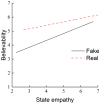The Influence of Affective Empathy on Online News Belief: The Moderated Mediation of State Empathy and News Type
- PMID: 38667074
- PMCID: PMC11047548
- DOI: 10.3390/bs14040278
The Influence of Affective Empathy on Online News Belief: The Moderated Mediation of State Empathy and News Type
Abstract
The belief in online news has become a topical issue. Previous studies demonstrated the role emotion plays in fake news vulnerability. However, few studies have explored the effect of empathy on online news belief. This study investigated the relationship between trait empathy, state empathy, belief in online news, and the potential moderating effect of news type. One hundred and forty undergraduates evaluated 50 online news pieces (25 real, 25 fake) regarding their belief, state empathy, valence, arousal, and familiarity. Trait empathy data were collected using the Chinese version of the Interpersonal Reactivity Index. State empathy was positively correlated with affective empathy in trait empathy and believability, and affective empathy was positively correlated with believability. The influence of affective empathy on news belief was partially mediated by state empathy and regulated by news type (fake, real). We discuss the influence of empathy on online news belief and its internal processes. This study shares some unique insights for researchers, practitioners, social media users, and social media platform providers.
Keywords: affective empathy; fake news; news belief; online news.
Conflict of interest statement
All authors disclosed no relevant relationships. The author(s) declared no potential conflicts of interest with respect to the research, authorship, and/or publication of this article. The funders had no role in the design of the study; in the collection, analyses, or interpretation of data; in the writing of the manuscript; or in the decision to publish the results.
Figures




Similar articles
-
Reliance on emotion promotes belief in fake news.Cogn Res Princ Implic. 2020 Oct 7;5(1):47. doi: 10.1186/s41235-020-00252-3. Cogn Res Princ Implic. 2020. PMID: 33026546 Free PMC article.
-
Negative Emotions and Job Burnout in News Media Workers: A Moderated Mediation Model of Rumination and Empathy.J Affect Disord. 2021 Jan 15;279:75-82. doi: 10.1016/j.jad.2020.09.123. Epub 2020 Oct 6. J Affect Disord. 2021. PMID: 33039777
-
Online Fake News about Food: Self-Evaluation, Social Influence, and the Stages of Change Moderation.Int J Environ Res Public Health. 2021 Mar 12;18(6):2934. doi: 10.3390/ijerph18062934. Int J Environ Res Public Health. 2021. PMID: 33809331 Free PMC article.
-
Fake news, disinformation and misinformation in social media: a review.Soc Netw Anal Min. 2023;13(1):30. doi: 10.1007/s13278-023-01028-5. Epub 2023 Feb 9. Soc Netw Anal Min. 2023. PMID: 36789378 Free PMC article. Review.
-
The Psychology of Fake News.Trends Cogn Sci. 2021 May;25(5):388-402. doi: 10.1016/j.tics.2021.02.007. Epub 2021 Mar 15. Trends Cogn Sci. 2021. PMID: 33736957 Review.
References
-
- Bronstein M.V., Pennycook G., Bear A., Rand D.G., Cannon T.D. Belief in fake news is associated with delusionality, dogmatism, religious fundamentalism, and reduced analytic thinking. J. Appl. Res. Mem. Cogn. 2019;8:108–117. doi: 10.1037/h0101832. - DOI
LinkOut - more resources
Full Text Sources

